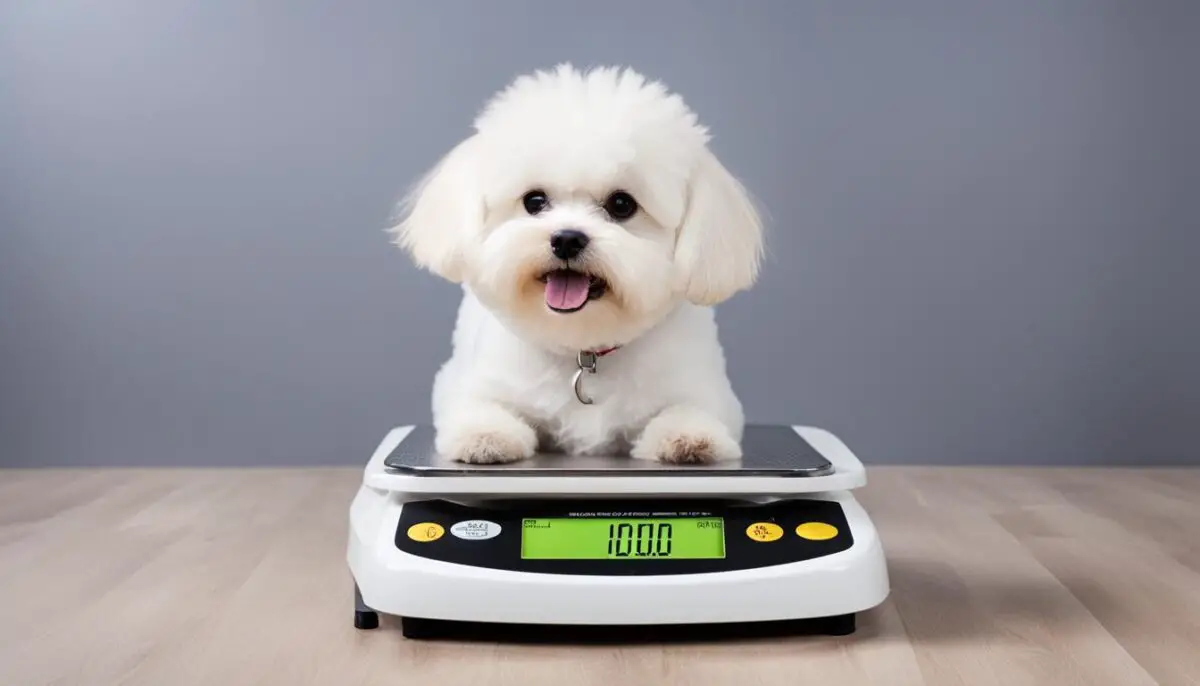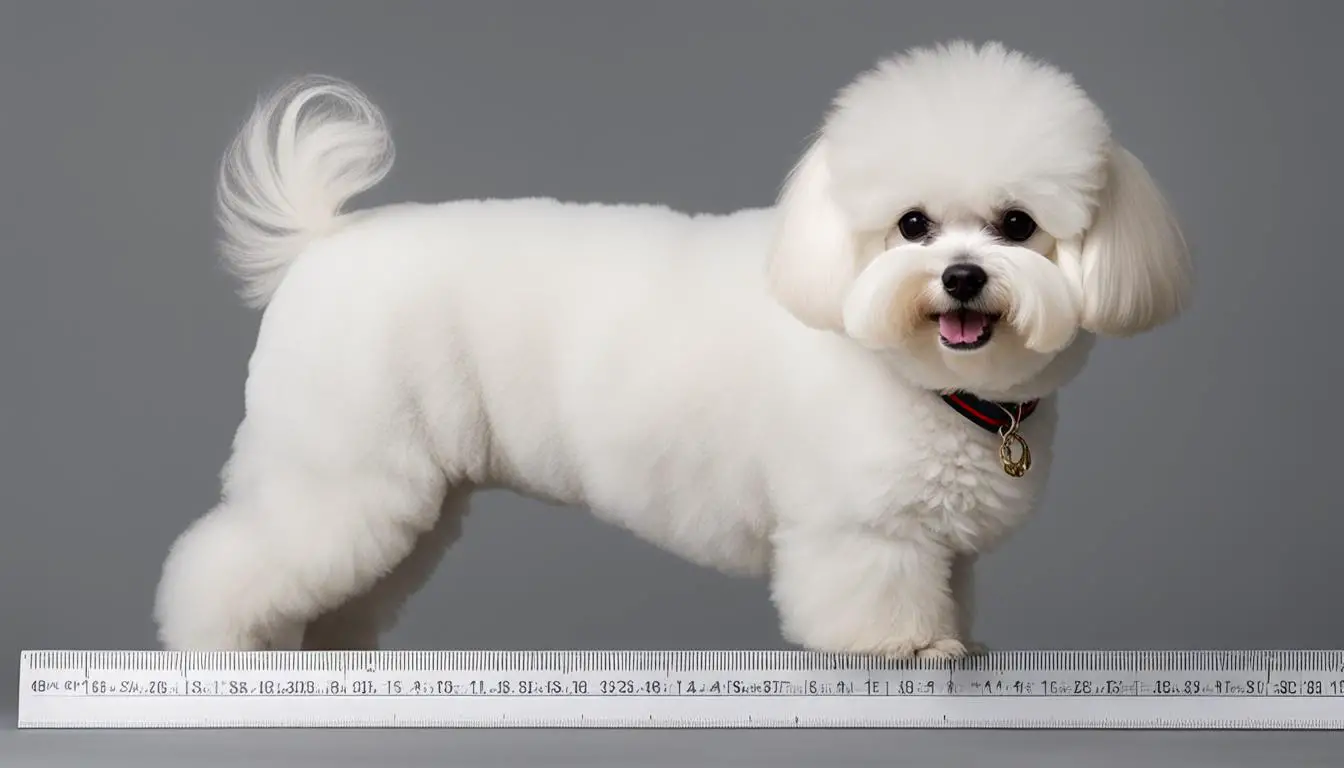The Bichon Frise is a small dog breed with an average weight range of 10-18 pounds and a height range of 10-12 inches at the shoulder. They have a fluffy white coat that requires regular grooming. These measurements can vary based on individual dogs and genetics. It’s important to monitor your Bichon Frise’s weight and height to ensure they stay within the ideal range for their size. Regular vet check-ups can help track their growth and development.
Key Takeaways:
- The Bichon Frise is a small dog breed with an average weight range of 10-18 pounds and a height range of 10-12 inches at the shoulder.
- Monitoring your Bichon Frise’s weight and height is important to ensure they stay within the ideal range for their size.
- Regular vet check-ups can help track their growth and development.
- Bichon Frises have a fluffy white coat that requires regular grooming.
- Individual dogs may vary in weight and height due to genetics.
Bichon Frise Size and Appearance
The Bichon Frise is a small dog breed known for its adorable appearance. They have a compact body and stand at a height of 10-12 inches at the shoulder. Their size makes them an ideal choice for individuals and families living in small spaces like apartments.Bichon Frise Weight and Height
One of the most striking physical characteristics of the Bichon Frise is its beautiful, fluffy coat. The breed has a dense double coat that is soft and curly, giving them a distinct and charming look. The coat comes in a pure white color, which further enhances their appeal.
With their short, blunt muzzle and expressive black eyes, Bichon Frises have a cute and friendly face that melts hearts. Their small size and adorable appearance make them a popular choice for pet owners looking for a lovable companion.
| Physical Characteristics | Description |
|---|---|
| Size | 10-12 inches at the shoulder |
| Coat | Fluffy, dense double coat in a pure white color |
| Muzzle | Short and blunt |
| Eyes | Expressive and dark |
The Bichon Frise’s size and appearance play a significant role in their charm and popularity. Their small stature, fluffy coat, and cute features make them an irresistible breed for pet lovers.
Bichon Frise Weight and Height Growth Chart
Keeping track of your Bichon Frise’s growth is important to ensure they are developing properly. Here is a growth chart that outlines the average weight and height milestones for Bichon Frises from birth to adulthood:
| Age | Weight Range (Male) | Height Range (Male) | Weight Range (Female) | Height Range (Female) |
|---|---|---|---|---|
| Newborn | 0.4-0.7 pounds | 2-3 inches | 0.4-0.7 pounds | 2-3 inches |
| 3 Months | 3-5 pounds | 6-8 inches | 3-5 pounds | 6-8 inches |
| 6 Months | 5-9 pounds | 8-10 inches | 5-9 pounds | 8-10 inches |
| 1 Year | 6-12 pounds | 9-11 inches | 6-12 pounds | 9-11 inches |
| 2 Years | 8-15 pounds | 10-12 inches | 8-15 pounds | 10-12 inches |
| 3 Years | 10-18 pounds | 10-12 inches | 10-18 pounds | 10-12 inches |
It’s important to remember that these are average ranges and individual Bichon Frises may vary. Regular vet check-ups can help assess your Bichon Frise’s growth and ensure they are on track. By monitoring their weight and height, you can ensure that they are developing properly and adjust their diet and exercise routine if necessary.average bichon frise weight
As your Bichon Frise grows, providing them with a balanced diet and regular exercise is crucial for their overall health and development. This growth chart can serve as a guide, but it’s important to consult with your veterinarian for personalized advice based on your Bichon Frise’s specific needs and genetics. By closely monitoring their growth and providing proper care, you can help your furry friend reach their full potential and live a happy, healthy life.
Bichon Frise Weight and Height: Factors That Affect Growth
Several factors can influence the growth of a Bichon Frise, including genetics, health, diet, and exercise. Understanding and addressing these factors is essential for ensuring your Bichon Frise’s healthy development.
Genetics: Genetics play a significant role in determining a Bichon Frise’s size and weight potential. Each dog is unique and may inherit traits from its parents that affect its growth. It’s important to be aware of the breed standard for Bichon Frises and monitor your dog’s growth to ensure they are within the expected range.
Health: Your Bichon Frise’s overall health can directly impact their growth. Regular veterinary check-ups are crucial for monitoring their health and identifying any underlying conditions that may affect their growth and development. It’s important to address any health issues promptly to optimize your dog’s growth potential.
Quote: “Maintaining a balanced diet and providing regular exercise are crucial for a Bichon Frise’s healthy growth and development.” – Veterinarian, Dr. Smith
Diet: Providing a nutritious and well-balanced diet is vital for supporting your Bichon Frise’s growth. Ensure they are receiving the appropriate amount of high-quality dog food that caters to their age and nutritional needs. Avoid overfeeding, as excess weight can lead to health problems. Consult with your veterinarian for specific dietary recommendations for your Bichon Frise.
Exercise: Regular exercise is important for maintaining your Bichon Frise’s overall health and weight. Engage in activities that provide both mental and physical stimulation, such as daily walks, playtime, and interactive toys. Exercise helps promote proper muscle development and contributes to your dog’s overall growth and well-being.
| Factors | Impact on Bichon Frise Growth |
|---|---|
| Genetics | Determines size and weight potential |
| Health | Can affect overall growth and development |
| Diet | Provides necessary nutrients for healthy growth |
| Exercise | Supports muscle development and overall well-being |
By considering these factors and providing appropriate care, you can help ensure that your Bichon Frise grows and develops in a healthy and balanced manner. Regular veterinary check-ups, a nutritious diet, and regular exercise are essential in supporting their growth and overall well-being.

Bichon Frise Size Guide for Pet Owners
As a pet owner, it’s helpful to have a size guide for your Bichon Frise. The breed standard specifies that they should weigh between 10-18 pounds and stand 10-12 inches tall at the shoulder. These measurements can serve as expectations for your Bichon Frise’s size. However, it’s important to remember that individual dogs may vary, and it’s best to consult with your veterinarian for specific guidance on your pet’s growth and development.ideal bichon frise height
Table: Bichon Frise Size Guide
| Weight Range | Height Range |
|---|---|
| 10-18 pounds | 10-12 inches |
While the breed standard provides a general guideline for the size of a Bichon Frise, there are factors that can affect their growth and size. Genetics, health conditions, diet, and exercise all play a role in determining their weight and height. Regular vet check-ups can help monitor their growth and ensure they are on track. Your veterinarian can provide personalized guidance based on your Bichon Frise’s specific needs.
It’s important to note that size is not the only determining factor when it comes to the temperament and personality of a Bichon Frise. Regardless of their size, Bichons are known for their friendly and playful nature. They make excellent companions for individuals and families alike. The small size of a Bichon Frise makes them suitable for various lifestyles, including apartment living, although they still require regular exercise and mental stimulation to prevent boredom and excess energy.
By understanding the size guide for Bichon Frises, pet owners can have a better idea of what to expect in terms of weight and height for their furry friends. Remember that individual dogs may vary, and it’s essential to consult with your veterinarian for personalized guidance on managing your Bichon Frise’s weight and height to ensure their overall health and well-being.
Understanding Bichon Frise Growth and Development
Understanding the growth and development stages of a Bichon Frise is essential for pet owners. From newborns to adulthood, Bichon Frises go through different stages that shape their size, behavior, and overall well-being.

Bichon Frise Growth Stages
The first stage of a Bichon Frise’s growth is puppyhood. As newborns, they weigh between 0.4 to 0.7 pounds and stand 2 to 3 inches tall. Over the next few months, they experience rapid growth and reach their adult height and weight within the first year.bichon frise height and weight standards
During adolescence, Bichon Frises may experience a slight growth spurt and may become more energetic and curious. This stage is crucial for their socialization and training. By the time they reach adulthood, usually around 1 to 2 years of age, Bichon Frises have reached their full size.
Bichon Frise Puppy Development
During the puppy stage, Bichon Frises develop physically and mentally. They start to explore their surroundings, learn basic commands, and develop their individual personalities. It is important to provide proper nutrition, regular vet check-ups, and plenty of socialization and training opportunities during this stage to ensure healthy development.
Bichon Frise Adult Stage
Once a Bichon Frise reaches adulthood, they have reached their full size and have a more settled temperament. They are fully developed physically and mentally and are ready to adapt to their owner’s lifestyle. Regular exercise, a balanced diet, and ongoing grooming are important to keep adult Bichon Frises healthy and happy.
| Growth Stage | Weight Range (Pounds) | Height Range (Inches) |
|---|---|---|
| Newborn | 0.4-0.7 | 2-3 |
| Puppyhood | Varies | Varies |
| Adolescence | Varies | Varies |
| Adulthood | 10-18 | 10-12 |
Understanding the different growth stages of a Bichon Frise can help pet owners provide the necessary care and support for their furry friends. From monitoring their weight and height to providing proper nutrition and exercise, every stage of a Bichon Frise’s growth contributes to their overall well-being and happiness.bichon frise weight chart
Bichon Frise Health Considerations for Weight and Height
Maintaining a healthy weight and height is crucial for the overall health and well-being of a Bichon Frise. Being overweight or underweight can contribute to various health problems, such as joint issues and bone problems. It’s important to monitor their weight and height and provide a balanced diet and regular exercise to support their overall health. Regular vet check-ups can help detect any potential health problems associated with weight and height.
Bichon Frises are prone to certain weight-related health problems. Obesity can put strain on their joints, leading to conditions like arthritis. It can also increase the risk of heart disease and diabetes. On the other hand, being underweight can weaken their bones and immune system, making them more susceptible to illnesses. Maintaining an optimal weight through proper nutrition and exercise is essential for their long-term health.
Height-related health problems can also occur in Bichon Frises. Being too tall or too short for their breed standard can lead to skeletal issues. If they are taller than the ideal height range, it can put excess stress on their joints and increase the risk of injuries. Conversely, if they are significantly shorter, it can result in skeletal abnormalities. Regular growth monitoring and providing appropriate care can help prevent or manage height-related health problems in Bichon Frises.
| Weight-related Health Problems | Height-related Health Problems |
|---|---|
| Obesity | Skeletal issues |
| Heart disease | Injuries |
| Diabetes | Skeletal abnormalities |
Taking care of a Bichon Frise’s joint and bone health is crucial for their overall well-being. Regular exercise, such as daily walks and playtime, can help keep their joints mobile and muscles strong. Avoiding excessive jumping or rough play can reduce the risk of joint injuries. Providing a balanced diet that includes essential nutrients like calcium and vitamin D is important for their bone health. Additionally, regular vet check-ups can help identify any early signs of joint or bone problems and allow for prompt treatment.how heavy should a bichon frise be
By prioritizing the health of a Bichon Frise’s weight and height, pet owners can ensure their furry companions lead happy and healthy lives. Monitoring their weight and height, providing proper nutrition and exercise, and seeking regular veterinary care are essential steps in maintaining their overall well-being.

Tips for Managing Bichon Frise Weight and Height
Proper weight and height management are important for the overall health and well-being of your Bichon Frise. Here are some tips to help you maintain a healthy weight and height for your furry friend: bichon frise weight and height requirements.
- Regular Exercise: Bichon Frises are active dogs and require daily exercise to burn off excess energy and maintain a healthy weight. Take them for walks, play fetch, or engage in interactive play sessions to keep them physically active and mentally stimulated.
- Portion Control: It’s important to provide your Bichon Frise with a balanced diet and control their portion sizes. Follow the feeding guidelines provided by your veterinarian and avoid overfeeding, as excessive weight gain can lead to health problems.
- Healthy Diet: Feed your Bichon Frise a nutritious diet that is appropriate for their age, size, and activity level. Choose high-quality dog food that is free from fillers and artificial additives. Consult with your veterinarian to determine the best diet for your pet.
- Vet Check-Ups: Regular veterinary check-ups are essential to monitor your Bichon Frise’s weight and height. Your vet can provide guidance on maintaining a healthy weight and can detect any potential health problems early on.
By following these tips, you can help your Bichon Frise maintain a healthy weight and height, ensuring their overall well-being and longevity. Remember to consult with your veterinarian for personalized advice and guidance based on your pet’s individual needs.bichon frise weight range
| Tips for Managing Bichon Frise Weight and Height |
|---|
| Regular Exercise |
| Portion Control |
| Healthy Diet |
| Vet Check-Ups |
Bichon Frise Size and its Impact on Lifestyle
The small size of a Bichon Frise makes them a perfect companion for various lifestyles, including apartment living. Their compact size allows them to adapt well to living in small spaces, making them an ideal choice for individuals or families who reside in apartments or houses with limited room. Despite their small stature, Bichon Frises still require regular exercise and mental stimulation to prevent boredom and excess energy.

Living in a small space doesn’t mean compromising on the happiness and well-being of your Bichon Frise. With their friendly and adaptable nature, Bichon Frises can thrive in apartment settings. However, it’s essential to provide them with regular exercise opportunities, such as daily walks or playtime, to keep them physically and mentally stimulated.
Additionally, creating an enriching environment by offering interactive toys, puzzle feeders, and engaging with them through training sessions can help prevent behavioral issues that may arise from being in a confined space.
In summary, the small size of a Bichon Frise makes them suitable for various lifestyles, including apartment living. While they may not require a large living space, they still need regular exercise and mental stimulation to thrive and be happy companions. By providing them with the appropriate care and attention, Bichon Frises can adapt well to small spaces and bring joy to their owners’ lives.
Bichon Frise Size and Temperament
The Bichon Frise is not only known for its small size but also for its delightful temperament. These adorable dogs have a friendly and affectionate nature that makes them wonderful companions for individuals and families alike. Despite their small stature, Bichon Frises are full of energy and love to play and interact with their owners.
With their friendly nature, Bichon Frises are often described as social butterflies. They enjoy meeting new people and are generally good with other dogs and pets. This makes them well-suited for households with multiple animals or those who enjoy socializing their pets. Whether you’re taking a walk in the park or hosting a gathering at home, your Bichon Frise is sure to bring joy and cheer to any situation.
Another notable characteristic of the Bichon Frise’s temperament is their intelligence. These dogs are quick learners and are eager to please their owners. They respond well to positive reinforcement training methods and enjoy participating in activities that challenge their minds. This intelligence, combined with their friendly and social nature, makes Bichon Frises highly trainable and adaptable to various environments.
“The Bichon Frise is a delightful breed that is known for their happy-go-lucky personality and affectionate nature. They are incredibly friendly and make excellent family pets. Despite their small size, they have a big heart and will bring endless joy and laughter to your home.” – Experienced Bichon Frise Owner
Key Points:
- The Bichon Frise has a friendly and affectionate temperament.
- They are social butterflies and enjoy meeting new people and animals.
- Bichon Frises are intelligent and highly trainable.
- They thrive in various environments and make wonderful family pets.
| Trait | Description |
|---|---|
| Temperament | The Bichon Frise is known for its friendly and affectionate nature. They are social and get along well with other dogs and pets. |
| Intelligence | Bichon Frises are intelligent and quick learners. They enjoy participating in training activities that challenge their minds. |
| Trainability | They are highly trainable and respond well to positive reinforcement training methods. They aim to please their owners. |
| Adaptability | Bichon Frises are adaptable to various environments. They can thrive in apartments or houses with limited space. |

Conclusion
Understanding the weight and height of a Bichon Frise is essential for pet owners. Monitoring their growth, providing appropriate care, and maintaining a healthy weight and height are crucial for their overall health and well-being. Regular vet check-ups, a balanced diet, and regular exercise can support their growth and development.
The small size of a Bichon Frise makes them suitable for various lifestyles, including apartment living. Their compact size allows them to adapt well to living in small spaces. However, it’s important to remember that individual dogs may vary, and it’s best to consult with a veterinarian for personalized guidance on your Bichon Frise’s weight and height.
By understanding and actively managing your Bichon Frise’s weight and height, you can ensure they lead a happy and healthy life. Their size should not be a limitation, but rather a characteristic that adds to their charm and adaptability. Remember to provide them with the necessary care, attention, and love they deserve to thrive as a cherished member of your family.
FAQ
What is the average weight and height of a Bichon Frise?
The average weight range for a Bichon Frise is 10-18 pounds, and they typically stand at 10-12 inches tall at the shoulder.
How can I track my Bichon Frise’s growth?
Regular vet check-ups can help monitor your Bichon Frise’s weight and height. They can also provide you with a weight and height chart specific to your dog’s breed.
What factors can affect the growth of a Bichon Frise?
Genetics, health conditions, diet, and exercise can all have an impact on a Bichon Frise’s growth. Regular vet check-ups and providing a balanced diet and regular exercise can support healthy growth.
How can I manage my Bichon Frise’s weight and height?
Regular exercise, portion control, and a balanced diet are all important in managing your Bichon Frise’s weight and height. Consulting with a veterinarian can provide personalized guidance.
Is the size of a Bichon Frise suitable for apartment living?
Yes, the small size of a Bichon Frise makes them adaptable to apartment living. However, they still require regular exercise and mental stimulation.
Does the size of a Bichon Frise determine their temperament?
No, the size of a Bichon Frise does not determine their temperament. They are known for their friendly and playful nature, regardless of their size.

